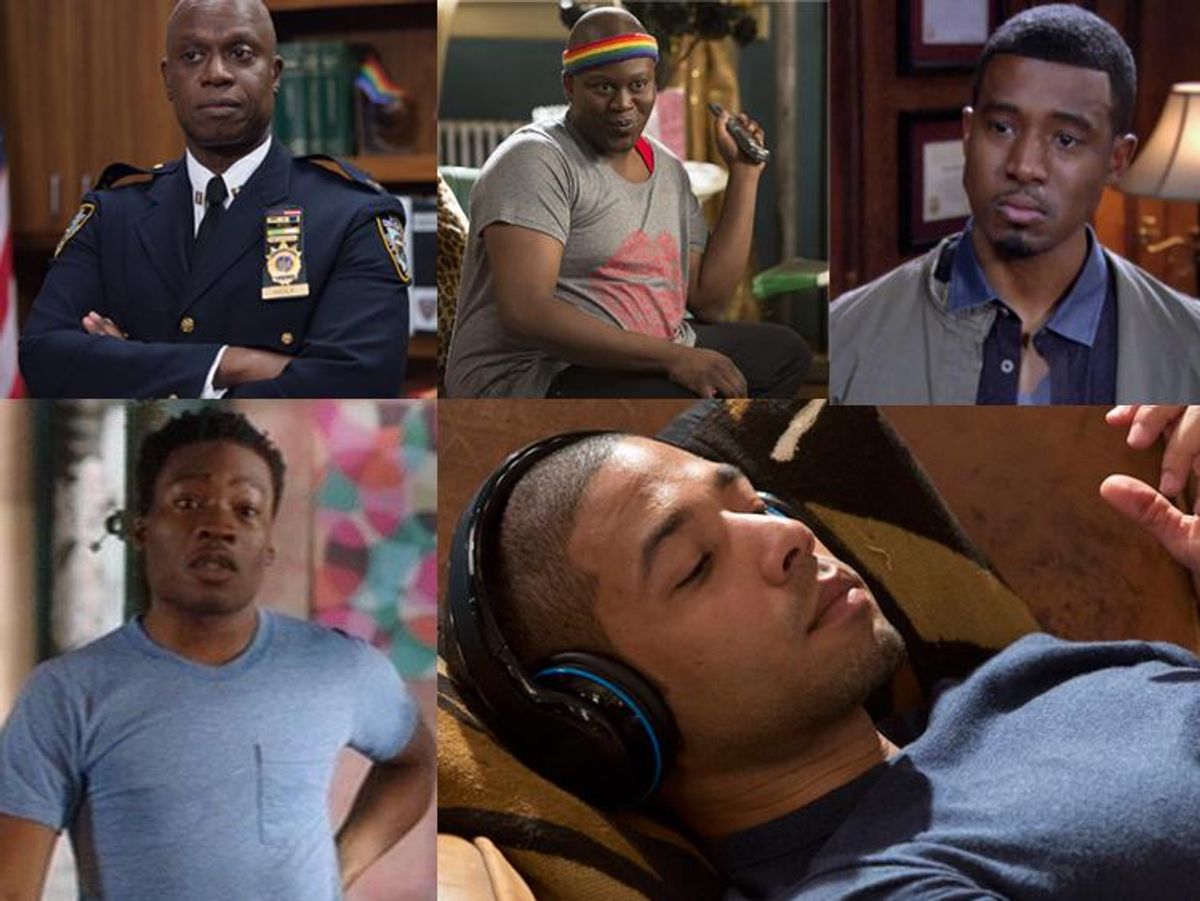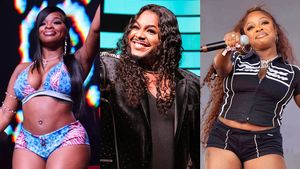I liked Noah's Arc. By no means a great show -- more soap opera than serious drama, it inspired more than its fair share of eye-rolling cliches -- but I liked it a lot because it was the only place on TV where I saw myself: characters that were black and gay and not relegated to the background or written off as a punchline.
When you're growing up, it's very important to see yourself -- to know that your experience and your existence has precedence; that you are not alone in how you feel and who you are, in short, to know that you matter. The media is an undeniable, inescapable presence in all of our lives that shapes the way we view ourselves and the world. So naturally, when you don't see yourself represented, you begin to feel as if you don't exist. And you relish and cling to any recognizable simulacrum of self, no matter how slight or inconsequential, as a major milestone.
Men on...TV

My favorite sketch on In Living Color was Damon Wayans and David Alan Grier starring as the flamboyant Blaine Edwards and Antoine Merriweather (respectively) in "Men on Film." While some felt Wayans and Grier were playing into offensive, even potentially dangerous, stereotypes, I was just happy to see two black sissies having a kiki on national TV. And not getting beat up or ridiculed for it. While we may have been laughing at them, Blaine and Antoine were always in on the joke and therefore they always had the last laugh.

With a tip of the wig to RuPaul's short-lived talk show, a handful of five-minute sketches for approximately three years in the early-'90s was the extent of the black gay men I saw on TV. Then Logo's Noah's Arc came along. It was basically the black Queer As Folk, a show I never watched because I didn't think a show about a bunch of white queens in Pittsburgh had anything to do with me.
All Aboard the Arc
Created by Patrik-Ian Polk, Noah's Arc chronicled the lives and loves of four black gay friends living in Los Angeles. No doubt sensing the unique platform he had, Polk attempted to tackle a number of serious issues facing the gay and black communities, often coming off a little "Very Special Episode of..."
Still, here were characters with whom I could identify and it felt revolutionary -- this little half-hour dramedy on basic cable whose endlessly photogenic protagonist looks like he just dug his way out of a Forever 21 sales bin was revolutionary.

Noah's Arc planted the seeds of the televised revolution we're seeing now with Fox's megahit Empire and other shows bringing black gay characters to the forefront.
"It was only a few years ago that GLAAD's annual television reports found that gay black men were one of the most underrepresented groups on television," Matt Kane, a program director at GLAAD, told the Daily News, "but the current influx of more diverse characters is a very promising sign."
Where There's a Rhimes, There's a Reason
Empire's runaway success speaks to television's increasing diversity, and over the past few years, Primetime's Messiah Shonda Rhimes has been the loudest voice. After all, we're in a year when three of the most popular and compelling characters on TV are black ladies (two of whom are on Shondaland shows) -- Viola Davis (How to Get Away With Murder), Kerry Washington (Scandal) and Taraji P. Henson (Empire). Rhimes has always written for and about strong women of color, but she's also been an advocate of complex gay characters-- even to the chagrin of her otherwise loyal fan base.
Following in the footsteps of Olivia Pope's Manolos, BET's Being Mary Jane and OWN's The Haves and Have Nots both feature gay black men forced to come to grips with their sexuality -- and their parents' reactions. Closeted anchorman Mark Bradley (Aaron D. Spears) fails to convince his parents that he's a card-carrying heterosexual, even with titular bad bitch Mary Jane (Gabrielle Union) posing as his beard. While both of Mark's parents are ultimately supportive of him, on Tyler Perry's The Haves and the Have Nots, drug counselor Jeffrey Harrington (Gavin Huston) has a loving and understanding father only for his mother to scorn him once he comes out.
Empire's Cookie Lyon (Henson) would have none of that.
Keys to the Empire
While dropping more F-bombs than an early-'00s Eminem verse, Cookie is the kind of supportive mother many a gay would kill for: fierce, loyal and more wigs than a Real Housewives reunion special. But the strained relationship between Jamal and Lucious (Terrence Howard) no doubt rings some painfully familiar bells among gay black men. It's fitting that Jussie Smollett plays Jamal Lyon, the gay son vying to inherit his homophobic father's musical empire; Smollet got his big break in Polk's 2012 film, The Skinny and he recently came out -- in a (frustrating) manner of speaking -- to America's favorite lesbian aunt, Ellen DeGeneres. Yet the non-announcement seemed to shy away from a definitive declaration, as Jamal made earlier this season.

That's not to say that Jamal is not a groundbreaking character -- he is, not just because his story is on a major network, but also because of the nature of his story. Homophobia in the black family and the black community has heretofore never been given such attention outside of a Maury Povich "down-low" episode and a lot of the credit belongs to show creator, Lee Daniels.
"The audience that is important for this show can't afford HBO," Daniels toldOut in January. "I'm talking about people that are impoverished, or people that haven't come out of their communities, or haven't left their blocks or their cities, and haven't seen the world. Oftentimes, a lot of these people are homophobic, I feel."
And while Daniels treatment of homosexuality can feel a little heavy-handed at times, it's rooted in truth -- for instance, the scene in the pilot in which Lucious stuffs Jamal in a trashcan actually happened to Daniels:
"When I was 5, my earliest memory was walking down the stairs in my mother's red high heel shoes, and my dad -- he's a cop -- is down playing cards with the boys and it was not pretty -- at all. He put me in a trash can and he said that I would never be nothing. He said, 'You already have it bad, boy, cause you're Black -- now you're a f****t too.' "
With all the advances in LGBT rights over the past few years, it's easy to forget that being gay is still a problem in large swathes of the country and remains a contentious issue in the black community. It's a very deliberate move, then, on Daniels' part, to create situations that will inspire dialogue and discussion.
The Unbreakables
However, not every gay black character on TV needs to stand for something. Just existing can be revolutionary enough. Capt. Ray Holt (Andre Braugher) has quietly but brilliantly made his presence known for two seasons on Fox's Brooklyn Nine-Nine. Holt's race and sexuality aren't platforms for social commentary, and as such, the majority of his laughs come from Braugher's perfectly deadpan delivery.

On the other end of the joke spectrum is Titus Andromedon, who runs away with the entire show (and should grab an Emmy on his way out) on Netflix's Unbreakable Kimmy Schmidt. A direct descendant from Blaine Edwards, Titus (Titus Burgess) is so flaming the fire department is on-call 24/7, but his sexuality is not the joke.
"Well, it's kind of the least of the things they play up," Burgess tellsOut, referring to how his character's gayness factors into the show. "It's more his entitlement, his delusional way of thinking, in terms of thinking he should be a star. It's more about the random situations he finds himself in. Titus is such a peculiar entity, which you'll see as the show goes on. This is not a show about... this is not Kimmy Has a Gay Best Friend. It's Titus Full-Throttle 3-D. And his sexual orientation is not a thing."
Looking for...
Though I can understand how some might find it divisive as it takes a not always flattering, often critical, look at us homosexuals, Looking is one of the best shows to capture the gay experience. But whileLookingis quick to criticize the lack of diversity and occasional blatant racism in the gay community, there are apparently no black queens in San Francisco to voice those complaints.
Race just isn't a difficult subject to discuss in America, in general, it's rarely brought up in the always striving to be politically-correct LGBT community, in particular. Gay politics and societal issues have always been framed through a distinctly white lens, as has the majority of our art and literature, so where Looking truly infuriates is in the missed opportunity to actively represent racism in the gay community. For HBO, once the hub of television's revolution, to be so far behind the times just goes to show how far TV has come -- though it doesn't represent where it's going.
Neatly tucked into the RuPaul's Drag Race premiere last week was a sneak peek of the Brit series,Cucumber & Banana, by UK Queer as Folk creator Russell T. Davies. I was blown away, mostly by Banana and its protagonist, Dean. A 19-year-old black kid slutting his way around London with Grindr as his tour guide. There I am, I thought. A character that looks like me, acts like me, does stupid shit like me. And it was written by a white dude. So maybe I'll give QAF another shot.
Banana, an anthology series acting as a companion piece to the self-contained Cucumber, strives to portray characters across the LGBT spectrum. Hopefully, then, we'll continue to see more diversity and everyone will get the chance to know that they exist -- that they matter.
Les Fabian Brathwaite -- haaaaaaated it.





























































































